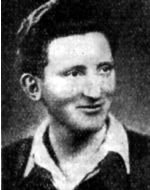Leibowitz, Daniel
Son of Berta and Yechezkel was born on the 11th of Kislev 5727 (11.12.1927) in the town of Shahi, Slovakia. His father was an agronomist by training and worked on an agricultural farm. Daniel graduated from elementary school in his city and prepared to study agriculture in high school, but because of the increase in anti-Semitism in the country did not allow the Jews to continue their studies. Daniel joined the Maccabi ha – Tsa’ir youth movement and the Gordonia youth movement. When Germany invaded Hungary, Daniel and all his family were among those led to the ghetto, and from there to the Gunskirchen concentration camp in Austria. Daniel and his brother were sent to forced labor, but his parents and one sister perished in the Auschwitz death camp. At the end of the war, Daniel joined a youth group that went to agricultural training in preparation for immigration to Eretz Israel. In 1946, when the group was formed, the young people set out on their long journey, with the ultimate goal being the Land of Israel. After a year of wandering throughout Europe, he boarded the illegal immigrant ship Theodore Herzl. The journey lasted several weeks, and as the ship approached the shores of the country, it was discovered by British planes and British battleships stopped it. In the “battle” that developed between the armed soldiers and the refugees, Daniel stood with the first line of fighters and fought until he was wounded in the hand, taken down to the beach and transferred to the Atlit detention camp. Upon his release from the camp, he hurried to join his friends in Kibbutz Hamadia in the Beit Shean Valley. He worked in the kibbutz energetically in a profession he studied in the Diaspora, electrification. In May 1948, Daniel was joined as a fighter in the 13th Battalion of the Golani Brigade. With his battalion fought in battles in the Jezreel Valley, Nazareth, Tzipori and Jenin. In the battle that failed in Jenin, he excelled at the time of the withdrawal, when he shot his machine gun at his retreating comrades. In Operation Horev, the expulsion of the Egyptian army from Israel, the Golani Brigade was tasked with creating a deception in the western wing of the front, before the main effort in the eastern wing began. On the night of December 22-23, 1948, the brigade captured the 86th position north of Khan Yunis, threatening the road and the railway, and gave the impression that the intention was to cut off the Egyptian forces in the Gaza Strip. The Egyptians reacted with a fierce counter-attack with the help of artillery and armor, and under enemy pressure the Golani fighters were forced to retreat. In this battle, on December 23, 1948, Daniel was hit by a bullet in the throat and fell. He was temporarily buried in the cemetery on Kibbutz Gvulot. He left behind a sister and two brothers. Later, he was laid to rest in the cemetery of his kibbutz, Hamadia. One of his nephews fell in the Yom Kippur War. Kibbutz Hamadia published a memorial booklet for his friends who fell in the war, and his image emerges as a kind person who knows how to extend a helping hand to a friend.
